
Neuroscience and Neurobiology Graduate Programs in America
1-25 of 137 results
MIT School of Science
Cambridge, MA •
Massachusetts Institute of Technology •
Graduate School
Massachusetts Institute of Technology ,
Graduate School ,
CAMBRIDGE, MA ,
Stanford University School of Medicine
Stanford, CA •
Stanford University •
- • Rating 5 out of 5 3 reviews
Doctoral Student: I begin in the Fall of 2023--Based on my interview, and pre-classes I have taken this program is amazing. It is very student-centered. ... Read 3 reviews
Stanford University ,
STANFORD, CA ,
3 Niche users give it an average review of 5 stars.
Featured Review: Doctoral Student says I begin in the Fall of 2023--Based on my interview, and pre-classes I have taken this program is amazing. It is very student-centered. .
Read 3 reviews.
Yale School of Medicine
New Haven, CT •
Yale University •
- • Rating 4.8 out of 5 5 reviews
Master's Student: So far, the interactions I have had with the administration are all positive. Administrators are very responsive and knowledgeable and helpful. ... Read 5 reviews
Yale University ,
NEW HAVEN, CT ,
5 Niche users give it an average review of 4.8 stars.
Featured Review: Master's Student says So far, the interactions I have had with the administration are all positive. Administrators are very responsive and knowledgeable and helpful. .
Read 5 reviews.
American University
Graduate School •
WASHINGTON, DC
- • Rating 4.54 out of 5 147
College of Arts and Sciences - Lehigh University
Lehigh University •
BETHLEHEM, PA
College of Arts and Sciences - American University
American University •
Harvard Medical School
Boston, MA •
Harvard University •
- • Rating 4.94 out of 5 16 reviews
Other: Harvard is my dream school. Next year I will graduate the Mongolian National University of Medical Sciences. Then I will applying to Harvard Medical School. If I accepted by this school, I will try my best of the best….. ... Read 16 reviews
Harvard University ,
BOSTON, MA ,
16 Niche users give it an average review of 4.9 stars.
Featured Review: Other says Harvard is my dream school. Next year I will graduate the Mongolian National University of Medical Sciences. Then I will applying to Harvard Medical School. If I accepted by this school, I will try... .
Read 16 reviews.
Princeton University
Princeton, NJ •
- • Rating 4.33 out of 5 3 reviews
Master's Student: The best part of the Princeton University mechanical engineering graduate degree is the excellent faculty that teach the courses. They are incredibly knowledgeable and also very willing to help students in office hours or in sponsorship of projects. The worst part of the Princeton University mechanical engineering graduate degree is the lack of structure for the graduate research program which can leave you feeling unsure on the direction of your research. ... Read 3 reviews
PRINCETON, NJ ,
3 Niche users give it an average review of 4.3 stars.
Featured Review: Master's Student says The best part of the Princeton University mechanical engineering graduate degree is the excellent faculty that teach the courses. They are incredibly knowledgeable and also very willing to help... .
Duke University School of Medicine
Durham, NC •
Duke University •
- • Rating 4.76 out of 5 17 reviews
Doctoral Student: Professors are incredible, always willing to go the extra mile to help students succeed. Curriculum is designed to prepare students to be successful therapists. This program is truly incredible. ... Read 17 reviews
Duke University ,
DURHAM, NC ,
17 Niche users give it an average review of 4.8 stars.
Featured Review: Doctoral Student says Professors are incredible, always willing to go the extra mile to help students succeed. Curriculum is designed to prepare students to be successful therapists. This program is truly incredible. .
Read 17 reviews.
- Find college scholarships
Alpert Medical School
Providence, RI •
Brown University •
- • Rating 4 out of 5 1 review
Graduate Student: I have had a great time here. It's really about the people. My fellow classmates are wonderful, brilliant, accomplished people and I am lucky to be here. The faculty are similarly great as are most of the physicians. I have very few complaints but here are 2 fairly big ones: 1. Research isn't emphasized enough. I was told many times first year not to worry about it "yet" but then was never told when I should worry about it. Luckily I found my own research projects but for competitive specialties, you can't act like research isn't a big deal. 2. Clinical grading is so subjective. I've gotten the exact same scores and received honors in one rotation but not another. I've gotten amazing comments but 4/5 scores or good comments but 5/5 scores. Also, having only Honors/Pass/Fail hurts people just out of the Honors range. No one fails. Yet those who barely try "earn" a Pass while those who perform well and try hard could get screwed by one tough evaluator and receive the same Pass. ... Read 1 review
Brown University ,
PROVIDENCE, RI ,
1 Niche users give it an average review of 4 stars.
Featured Review: Graduate Student says I have had a great time here. It's really about the people. My fellow classmates are wonderful, brilliant, accomplished people and I am lucky to be here. The faculty are similarly great as are most... I have very few complaints but here are 2 fairly big ones: 1. Research isn't emphasized enough. I was told many times first year not to worry about it "yet" but then was never told when I should worry about it. Luckily I found my own research projects but... 2. Clinical grading is so subjective. I've gotten the exact same scores and received honors in one rotation but not another. I've gotten amazing comments but 4/5 scores or good comments but 5/5... .
Read 1 reviews.
Perelman School of Medicine
Philadelphia, PA •
University of Pennsylvania •
- • Rating 5 out of 5 5 reviews
Master's Student: I am a first year, but I love Penn and my MPH program so much! I've never been surrounded by so many like-minded individuals before in my life. ... Read 5 reviews
University of Pennsylvania ,
PHILADELPHIA, PA ,
5 Niche users give it an average review of 5 stars.
Featured Review: Master's Student says I am a first year, but I love Penn and my MPH program so much! I've never been surrounded by so many like-minded individuals before in my life. .
Feinberg School of Medicine
Chicago, IL •
Northwestern University •
- • Rating 4.5 out of 5 4 reviews
Doctoral Student: Northwestern's PT program is incredible! They have many opportunities for research, involvement, and overall, they set us up very well for success in the field. ... Read 4 reviews
Northwestern University ,
CHICAGO, IL ,
4 Niche users give it an average review of 4.5 stars.
Featured Review: Doctoral Student says Northwestern's PT program is incredible! They have many opportunities for research, involvement, and overall, they set us up very well for success in the field. .
Read 4 reviews.
Weinberg College of Arts and Sciences
Evanston, IL •
EVANSTON, IL ,
Northwestern University School of Communication
Vanderbilt university school of medicine.
Nashville, TN •
Vanderbilt University •
- • Rating 5 out of 5 2 reviews
Graduate Student: Vanderbilt University School of Nursing. Loved my experience! Great teachers, easy to access, clear cut goals in class, great clinical experiences. ... Read 2 reviews
Vanderbilt University ,
NASHVILLE, TN ,
2 Niche users give it an average review of 5 stars.
Featured Review: Graduate Student says Vanderbilt University School of Nursing. Loved my experience! Great teachers, easy to access, clear cut goals in class, great clinical experiences. .
Read 2 reviews.
- Sponsored Find Student Loan Options
- Biophysics Graduate Programs
- Botany and Plant Physiology Graduate Programs
Washington University School of Medicine in St. Louis
St. Louis, MO •
Washington University in St. Louis •
- • Rating 4.73 out of 5 15 reviews
Doctoral Student: So far, my experience had been amazing! The drive and parking are not the best, but the students and staff are very good. ... Read 15 reviews
Washington University in St. Louis ,
ST. LOUIS, MO ,
15 Niche users give it an average review of 4.7 stars.
Featured Review: Doctoral Student says So far, my experience had been amazing! The drive and parking are not the best, but the students and staff are very good. .
Read 15 reviews.
Geisel School of Medicine
Hanover, NH •
Dartmouth College •
Current Doctoral student: Geisel is an incredible school with very passionate faculty who go out of their way to help every student find success, which is extremely rare among medical schools. Whether it be research, residency, or clinicals, I have never encountered a group of individuals so committed by default to students they may not have even met before. The match list speaks for itself; most students depart to their top choice hospitals across the country every year. On top of it all, the Upper Valley is one of the nicest areas to live in the Northeast. It has an abundance of natural beauty, is within a couple of hours of many ski mountains, two hours from Boston, and a lot of growth in the past decade has led to the creation of many cute little locally owned businesses, restaurants, and bars that are frequented by Dartmouth students. I chose Geisel of a number of other schools and have never regretted my decision once. ... Read 3 reviews
Dartmouth College ,
HANOVER, NH ,
Featured Review: Current Doctoral student says Geisel is an incredible school with very passionate faculty who go out of their way to help every student find success, which is extremely rare among medical schools. Whether it be research,... .
Division of Biology and Biological Engineering - California Institute of Technology
Pasadena, CA •
California Institute of Technology •
California Institute of Technology ,
PASADENA, CA ,
Division of the Humanities and Social Sciences - California Institute of Technology
Biological sciences division - university of chicago.
University of Chicago •
Master's Student: So far so good. Nothing out of the ordinary. Professors are knowledgeable. I would say to ensure that you know your interests and work closely with the advisors to pick suitable classes. ... Read 1 review
University of Chicago ,
Featured Review: Master's Student says So far so good. Nothing out of the ordinary. Professors are knowledgeable. I would say to ensure that you know your interests and work closely with the advisors to pick suitable classes. .
USC Neuroscience Graduate Program
Los Angeles, CA •
University of Southern California •
University of Southern California ,
LOS ANGELES, CA ,
Cornell University College of Agriculture and Life Sciences
Ithaca, NY •
Cornell University •
Cornell University ,
ITHACA, NY ,
Weill Cornell Graduate School of Medical Sciences
New York, NY •
- • Rating 4.75 out of 5 4 reviews
Doctoral Student: The coursework was relevant, a little disjointed but good. There could be a wider range of courses that would be great, but it’s nice that we can take courses from other universities. ... Read 4 reviews
NEW YORK, NY ,
4 Niche users give it an average review of 4.8 stars.
Featured Review: Doctoral Student says The coursework was relevant, a little disjointed but good. There could be a wider range of courses that would be great, but it’s nice that we can take courses from other universities. .
University of Michigan Medical School
Ann Arbor, MI •
University of Michigan - Ann Arbor •
Current Doctoral student: University of Michigan Medical School offers an exceptional medical education experience. What is unique about Michigan medical school is the innovative focus they have on their curriculum and culture of continuous improvement. The pre-clinical curriculum is only 12 months, which allows students to start their core clinical rotations in their second year. This affords students the opportunity to gain and improve upon clinical skills early, have more time to do research and cultivate career interests, and builds a foundation of knowledge that makes the students some of the best clinically trained in the country. Not only is the student body full of people with diverse, impressive accomplishments and experiences, but the culture is one where students genuinely value and support each other. ... Read 2 reviews
University of Michigan - Ann Arbor ,
ANN ARBOR, MI ,
Featured Review: Current Doctoral student says University of Michigan Medical School offers an exceptional medical education experience. What is unique about Michigan medical school is the innovative focus they have on their curriculum and... .
Georgetown University School of Medicine
Nw Washington, DC •
Georgetown University •
Doctoral Student: Compressed pre-clinical work. Administration has been working on finding better and better educators, as well as hiring more learning specialists for the student body. Could have more focus on Step 1 and Step 2 preparation. ... Read 4 reviews
Georgetown University ,
NW WASHINGTON, DC ,
Featured Review: Doctoral Student says Compressed pre-clinical work. Administration has been working on finding better and better educators, as well as hiring more learning specialists for the student body. Could have more focus on Step 1... .
Graduate School of Biomedical Sciences - Tufts University
Tufts University •
Tufts University ,
David Geffen School of Medicine
University of California - Los Angeles •
- • Rating 5 out of 5 1 review
Alum: It was excellent. Opportunities were bountiful. I had the opportunity to rotate at sites that included RRMC, VA, Oliveview County Hospital, Harbor County Hospital, and Cedar-Sinai Medical Center. I was to develop deep and rewarding relationships with mentors which helped me to match at my first choice program for residency. Training in SoCal is also a plus. Fortunately, the school provided subsidized student housing which made living in West LA very affordable. ... Read 1 review
University of California - Los Angeles ,
1 Niche users give it an average review of 5 stars.
Featured Review: Alum says It was excellent. Opportunities were bountiful. I had the opportunity to rotate at sites that included RRMC, VA, Oliveview County Hospital, Harbor County Hospital, and Cedar-Sinai Medical Center. I... .
Johns Hopkins School of Medicine
Baltimore, MD •
Johns Hopkins University •
- • Rating 4 out of 5 2 reviews
Doctoral Student: Best parts were the professors who were top of their field and open to working with students on all varieties of research projects. Worst parts were the quality of Zoom lectures. ... Read 2 reviews
Johns Hopkins University ,
BALTIMORE, MD ,
2 Niche users give it an average review of 4 stars.
Featured Review: Doctoral Student says Best parts were the professors who were top of their field and open to working with students on all varieties of research projects. Worst parts were the quality of Zoom lectures. .
Lehigh University
- • Rating 4.42 out of 5 19
Tulane University
NEW ORLEANS, LA
- • Rating 4.17 out of 5 35
Kenneth P. Dietrich School of Arts and Sciences
University of Pittsburgh •
PITTSBURGH, PA
Showing results 1 through 25 of 137
Welcome to Stanford Neurosciences

The Stanford Neurosciences Interdepartmental Program (IDP) offers interdisciplinary training leading to a Ph.D. in Neuroscience. The primary goal of the program is to train students to become leaders in neuroscience research, education and outreach. Graduates of the program will be innovators, investigators, and teachers whose programs and pursuits are founded on research. The signature feature of the Stanford Neurosciences IDP is the combination of outstanding faculty researchers and exceedingly bright, energetic students in a community that shares a firm and longstanding commitment to understanding the nervous system at all its levels of function.
Program News
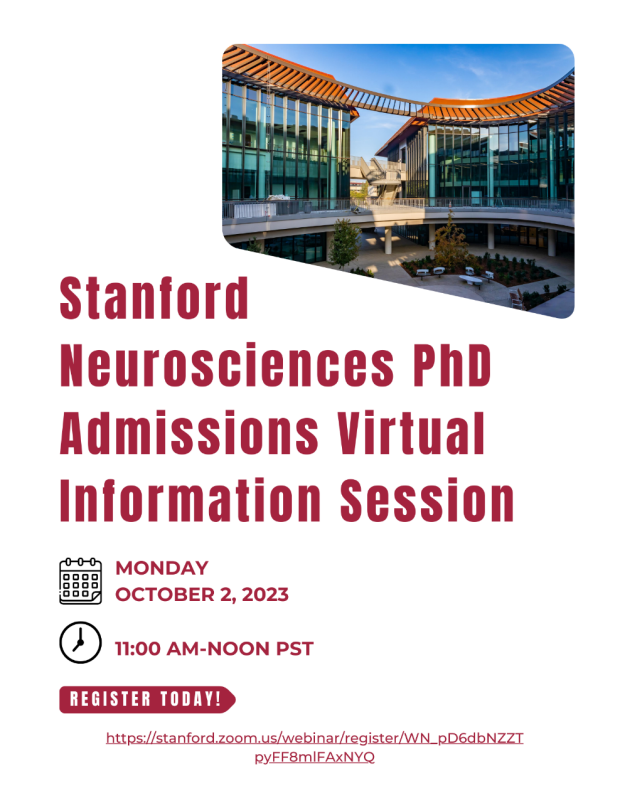
Admissions Information Session
Join us virtually to learn more about the Stanford Neurosciences PhD program and the admissions process.
Monday, October 2, 2023
11:00 am - 12:00 pm PST
Registration: https://stanford.zoom.us/webinar/register/WN_pD6dbNZZTpyFF8mlFAxNYQ
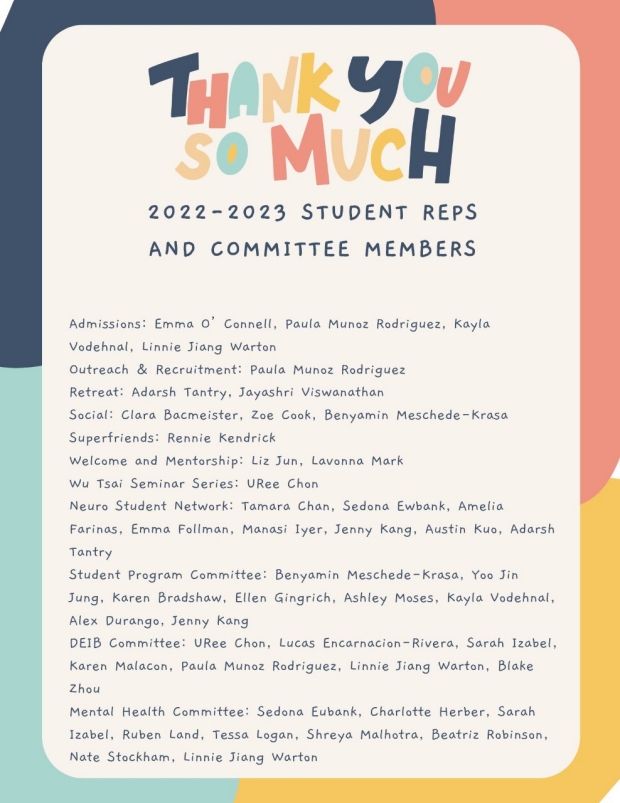
Thank You, 2022-23 Student Reps and Committee Members!
2022-23 was a busy and engaging year in the program. Thank you to the Student Reps and Committee Members who led the way in bringing the community together!
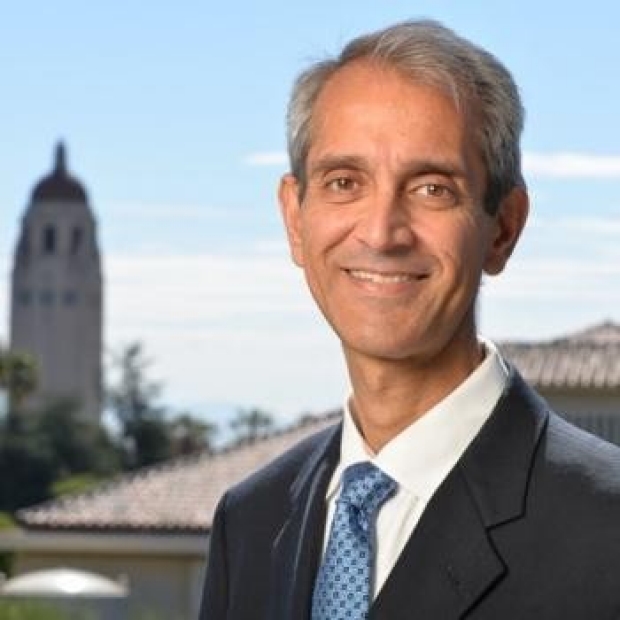
Krishna Shenoy, engineer who reimagined how the brain makes the body move, dies at 54
Shenoy was a pioneer of neuroprosthetics, a field that paired chips implanted in the brain with algorithms able to decipher the chatter between neurons, allowing people with paralysis to control computers and mechanical limbs with their thoughts. Read more
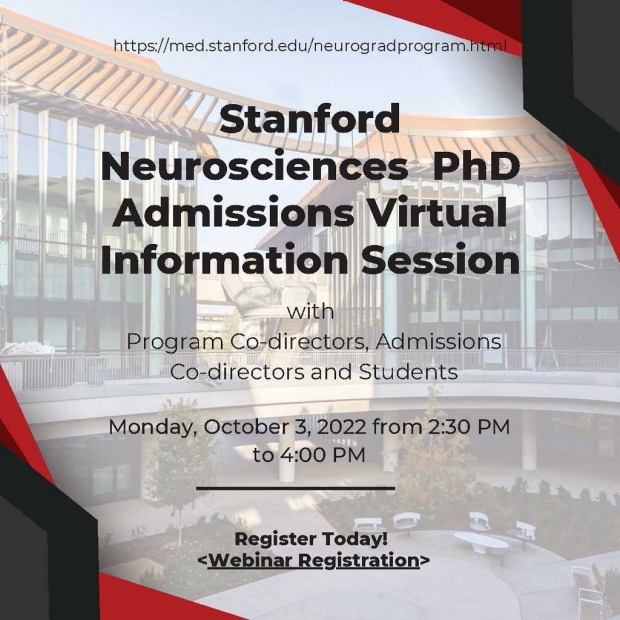
Virtual Information Session - Monday, October 3, 2022
Virtual Information Session - Monday, October 4, 2021
Our Commitment to Diversity, Equity and Inclusion
Tirin Moore wins 2021 Pradel Research Award
Dr. Shah elected as a Fellow of the American Association for the Advancement of Science
Dr. Jeffrey Goldberg elected to National Academy of Medicine
Incorporating Anti-Racism/Anti-Oppression Training for our incoming class
Thomas R. Clandinin elected to the American Academy of Arts and Sciences
Kevin Guttenplan recognized by Biosciences Excellence in Teaching Award
Karl Deisseroth wins 2020 Heineken Prize for Medicine
Daniel Cardozo Pinto wins Gilliam Prize
President Marc Tessier-Lavigne donates Gruber Neuroscience Prize money to support Neuro grads who are under-represented

- Majors & Careers
- Online Grad School
- Preparing For Grad School
- Student Life
Best Neuroscience PhD Programs: Careers, and More [2024]

Are you looking for the best neuroscience PhD programs of 2024? You’re lucky because I have compiled the best neuroscience PhD programs list. Before we get into the individual programs, let’s first dive into what neuroscience is.
Neuroscience is a branch of biological science studying the brain, emphasizing its biochemistry, molecular biology, psychology, and anatomy to understand human and animal behavior. It offers an in-depth understanding of brain diseases and abnormalities so we can develop solutions using studies with neuroscientific models.
An expert neuroscientist can make significant contributions to society, and a PhD in neuroscience will equip you to pursue a prestigious career in the field. According to Salary Expert , the average annual salary of neuroscience PhD holders is $113,946. That number is expected to rise to $129,991 by 2028, making this one of the highest-paying PhDs .
Ready to find your dream PhD program in neuroscience? Let’s get started.
Table of Contents
Best Neuroscience PhD Programs
Harvard university, harvard medical school.
Ph.D. Program in Neuroscience (PiN)

The Neurobiology Department of Harvard Medical School is the first research department in the world to take an interdisciplinary, systemic approach to studying the human brain. This program is one of the more competitive PhDs in neuroscience and offers a wide range of electives in a flexible format. Students can easily balance their coursework and lab work with hybrid and online learning.
- Courses : Quantitative methods for biologists, rotations in neuroscience, and discipline of neuroscience.
- Duration : 3 years or more
- Delivery : On-campus
- Tuition : Full funding
- Financial aid : Full tuition/stipend support, health insurance, childcare support, parental support, and travel allowance.
- Acceptance rate: 5%
- Location : Boston, Massachusetts
Massachusetts Institute of Technology
Brain and Cognitive Sciences PhD Program

MIT’s Department of Brain and Cognitive Sciences claims to produce the world’s sharpest and most innovative brain scientists. This PhD program enables students to pursue cutting-edge research that seeks to push the boundaries of neuroscientific knowledge.
- Courses : Molecular & cellular neuroscience, computational cognitive science, and statistics for neuroscience research.
- Duration : 5 years plus
- Tuition : $29,875 per term
- Financial aid: Scholarships, loans, and health insurance.
- Acceptance rate : 7.3%
- Location : Cambridge, Massachusetts
Stanford University, School of Medicine
Neurosciences Ph.D. Program

Stanford is one of the leading research universities in the world. This PhD program is one of 14 “Biosciences Home Programs” offered by the institution’s School of Medicine. One of the best neuroscience PhD programs the USA provides, it enables students to design their post-graduate studies by working collaboratively with an extensive network of faculty and labs.
- Courses : Responsible conduct of neuroscience, neuroscience systems core, and neurogenetics core.
- Credits : 135 units
- Duration : 5 years
- Tuition : Refer tuition page
- Financial aid: Fellowships, grants, research assistantships, teaching assistantships, and veteran benefits.
- Acceptance rate : 5.2%
- Location : Stanford, California
Princeton University, Graduate School
Ph.D. in Neuroscience

Princeton University is a globally acclaimed school with a long list of Nobel laureates and other honors. This one in our list of the best neuroscience PhD programs emphasizes hands-on experience, encouraging students to apply the concepts they learn in lectures in the lab.
- Courses : Cellular & circuits Neuroscience, computational neuroscience, and Statistics for Neuroscience.
- Tuition : $59,710 per year
- Financial aid : Fellowships, research assistantships, teaching assistantships, external funding, travel grants, veteran benefits, and loans.
- Acceptance rate : 5.6%
- Location : Princeton, New Jersey
Yale University, School of Medicine
Interdepartmental Neuroscience Program

Yale is another world-renowned university with several cultural centers to preserve the institution’s unique cultural identity. This interdepartmental PhD program is called a “department without walls” as it allows students to explore every aspect of neuroscience with the help of over 100 faculty members from more than twenty departments.
- Courses : Principles of neuroscience, foundations of systems neuroscience, and bioethics in neuroscience.
- Duration : Up to 7 years
- Tuition : $48,300 per year
- Financial aid : Fellowships, awards, research assistantships, loans, and travel funds.
- Acceptance rate : 6.5%
- Location : New Haven, Connecticut
The University of California San Francisco, Weill Institute for Neurosciences
Neuroscience Graduate Program

The University of California San Francisco is a big name committed to diversity and follows the JEDI (justice, equity, diversity, and inclusion) approach to promote a positive campus environment. This post-graduate program allows students to work collaboratively with faculty members across various departments who are well-known names in their respective fields.
- Courses : Cellular & molecular neuroscience, systems & behavioral neuroscience, and computational neuroscience.
- Duration : 4 – 6 years
- Tuition : $11,442 per year
- Financial aid : Fellowships, awards, grants, and teaching assistantships.
- Acceptance rate : 3.7%
- Location : San Francisco, California
Brown University

Brown University is located in the culturally diverse city of Providence, Rhode Island. The program emphasizes intellectual freedom and has an “Open Curriculum” system at the undergraduate level, which confirms this. This PhD in neuroscience program involves various experimental approaches, including a Graduate Partnership Program (GPP) with NIH (National Institutes of Health).
- Courses : Advanced molecular & cellular neurobiology, advanced systems neuroscience, and neuroanatomy.
- Tuition : $8,207 per course
- Financial aid : Full funding, stipend, health insurance, grants, fellowships, and teaching assistantships.
- Acceptance rate : 7.7%
- Location : Providence, Rhode Island
Johns Hopkins University, School of Medicine
Neuroscience Training Program

The Neuroscience Department at Johns Hopkins University was one of the country’s first academic centers for Neuroscience. Its PhD program is well-regarded, offering students ample opportunities for lab rotations, a wide selection of electives, and seminar series from eminent national and international scholars.
- Courses : Neuroscience cognition, quantitative methods for the brain sciences, and neuron models.
- Duration : 3 years plus
- Tuition : Full tuition, stipend, and benefits
- Financial aid: Fellowships, loans, scholarships, and grants.
- Acceptance rate : 11.1%
- Location : Baltimore, Maryland
California Institute of Technology, Division of Biology and Biological Engineering
Neurobiology Graduate Program

Caltech is a private institution dedicated to excellence in technological education and research. This Ph.D. program allows students to conduct advanced research in molecular mechanisms of nervous system development, the evolution of the brain and behavior in primates, neuroscience of brain disorders, and neuro-engineering.
- Courses : Tools of neurobiology, molecular, cellular, and developmental neurobiology, and circuits, systems, and behavioral biology.
- Credits : 54 units (6 quarter courses)
- Tuition : $56,364 per year
- Financial aid : Teaching assistantships, fellowships, loans, research assistantships, and full funding.
- Acceptance rate : 6.7%
- Location : Pasadena, California
The University of Chicago, Biological Sciences Division
PhD Program in Computational Neuroscience

The University of Chicago is a renowned institution that has pioneered neuroscience research by eminent scientists like K. C. Cole, Stephen Polyak, and Jack Cowan. The school’s PhD in Computational Neuroscience offers an in-depth understanding of how various neural components affect human and animal behavior.
- Courses : Cellular neurobiology, methods in computational neuroscience, and behavioral neuroscience.
- Tuition : $19,035 per quarter
- Financial aid : Grants, fellowships, awards, stipends, and research assistantships.
- Location : Chicago, Illinois
What Do I Need to Get a PhD in Neuroscience?
You’ll need an undergraduate degree in biological sciences or a related field. Some programs may also require a master’s in a relevant field; others may ask for GRE scores as part of the application process. You must complete coursework, research, and a dissertation paper throughout the program, meet teaching requirements and seminars, and pass qualifying examinations.
What to Consider When Choosing a Neuroscience PhD Program
Neuroscience is a highly specialized field that often involves interdisciplinary research. Therefore, looking for programs offering specializations in your areas of interest and with faculty members who are experts in these fields is essential. It’s also vital to consider applicable tuition, other fees, location, and whether the program offers the type of study you want (on-campus, online, or hybrid learning).
Once you decide on the best neuroscience PhD program for you, laying some groundwork is a good idea. This will help you create a more robust application and better prepare for the program. Read up on the latest neuroscience research and think about potential subjects for your dissertation. Build your sector network and start making connections that will help you with your studies and beyond.
Why Get a Doctorate in Neuroscience?
A doctorate in neuroscience can make you a valuable expert in one of the top branches of the biological sciences. You’ll have plenty of opportunities in this field to perform exciting, valuable, and innovative research.
This advanced degree will also qualify you for many well-paid roles, including:
- Medical Science Liaison ( $149,911 )
- Senior Clinical Research Associate ( $114,764 )
- Neuroscientist ( $81,661 )
- Research Scientist ( $87,532 )
- Program Director, Healthcare ( $87,780 )
- Assistant Professor, Postsecondary/Higher Education ( $73,907 )
PhD in Neuroscience: Key Facts
What is the average cost of a phd in neuroscience.
The cost of completing a Ph.D. in neuroscience varies depending on factors like the school, the program, and other expenses like accommodation. A reputable PhD in neuroscience program can range anywhere from $10K to $60K per year.
How Long Does It Take to Get a PhD in Neuroscience?
Getting a PhD in Neuroscience usually takes between 3 and 7 years.
What Skills Do You Gain from a PhD in Neuroscience?
A PhD in Neuroscience awards you a range of skills, most notably:
- The ability to develop testable neuroscientific hypotheses and conduct studies using experimental, statistical, and literature review methods.
- Laboratory skills related to researching behavioral Neuroscience concepts.
- Scientific written communication skills.
PhD Neuroscience Program Statistics
- A PhD in neuroscience program can expect hundreds of applicants — the average is around 170 .
- Most neuroscience PhD candidates have an undergraduate degree in psychology, biology, or neuroscience , though they may have backgrounds in other fields, even non-science ones such as business or humanities.
- Most schools only accept a few neuroscience PhD candidates a year based on stringent criteria. For example, The University of Texas at Dallas accepts an average of 10-20 students per year.
Key Takeaways
With intake numbers for PhDs in neuroscience programs being relatively small, it’s essential to start preparing early to assemble the most robust application possible. Once you get accepted into your dream program, the future will be bright, with the Bureau of Labor Statistics estimating a 10% growth in jobs for medical scientists between 2022 and 2032. From high salary prospects to the opportunity to make valuable contributions to society, you’re sure to have a rewarding career as a neuroscientist!
If you’re deciding between neuroscience and psychology, check out our guides to the best Master’s in Psychology and the best online PhD in Psychology programs .
Frequently Asked Questions
How competitive are neuroscience doctoral programs.
Neuroscience PhD programs can be highly competitive. Even when there are hundreds of applicants, only 10 or so may be accepted each year by each program. Therefore, it’s essential to have a strong academic record and prepare a compelling application to be accepted into your dream program.
Do Neuroscientists Need a PhD?
This depends on the exact neuroscience role you want. Typically, you’ll need a PhD in neuroscience to work as a research scientist, senior research associate, or neuroscience professor at a post-secondary school. However, you may be eligible for entry-level neuroscience roles with an undergraduate or master’s degree .
Does Harvard Have a Neuroscience Major?
Yes, Harvard University offers one of the USA’s most reputable neuroscience doctorate programs .

Lisa Marlin
Lisa is a full-time writer specializing in career advice, further education, and personal development. She works from all over the world, and when not writing you'll find her hiking, practicing yoga, or enjoying a glass of Malbec.
- Lisa Marlin https://blog.thegradcafe.com/author/lisa-marlin/ ACBSP Vs AACSB: Which Business Program Accreditations is Better?
- Lisa Marlin https://blog.thegradcafe.com/author/lisa-marlin/ BA vs BS: What You Need to Know [2024 Guide]
- Lisa Marlin https://blog.thegradcafe.com/author/lisa-marlin/ The 19 Best MBA Scholarships to Apply for [2024-2025]
- Lisa Marlin https://blog.thegradcafe.com/author/lisa-marlin/ 25 Best Gifts for Law Students for 2024
Top 10 Best PhD in Computer Science Programs
Best online master’s in nutrition programs, related posts.

- 73% of job seekers believe a degree is needed for a well-paying role–but is it?

Tech Talent Crunch: Cities with More Jobs Than Workers

The Most Under-Rated Career Advancement Tip for 2024

Top 5 Best Psychology PhD Programs in 2024

Good News For Early Careers: Skills-Based Hiring is Surging

These Are The Best States To Start Your Tech Career

Best Online Master's in Nutrition Programs
Leave a reply cancel reply.
Your email address will not be published. Required fields are marked *
Save my name, email, and website in this browser for the next time I comment.
Recent Posts
- Is a Master’s Degree Worth It? [2024 Guide]
- Graduate Certificate vs Degree: What’s the Difference? [2024 Guide]
- ACBSP Vs AACSB: Which Business Program Accreditations is Better?
- What is a Good GRE Score?

© 2024 TheGradCafe.com All rights reserved
- Partner With Us
- Results Search
- Submit Your Results
- Write For Us
Neuroscience Ph.D. Program
Our Neuroscience Ph.D. Program is one of the best in the nation, and prepares students to become independent researchers, educators and trainers making significant contributions across all aspects of the field.
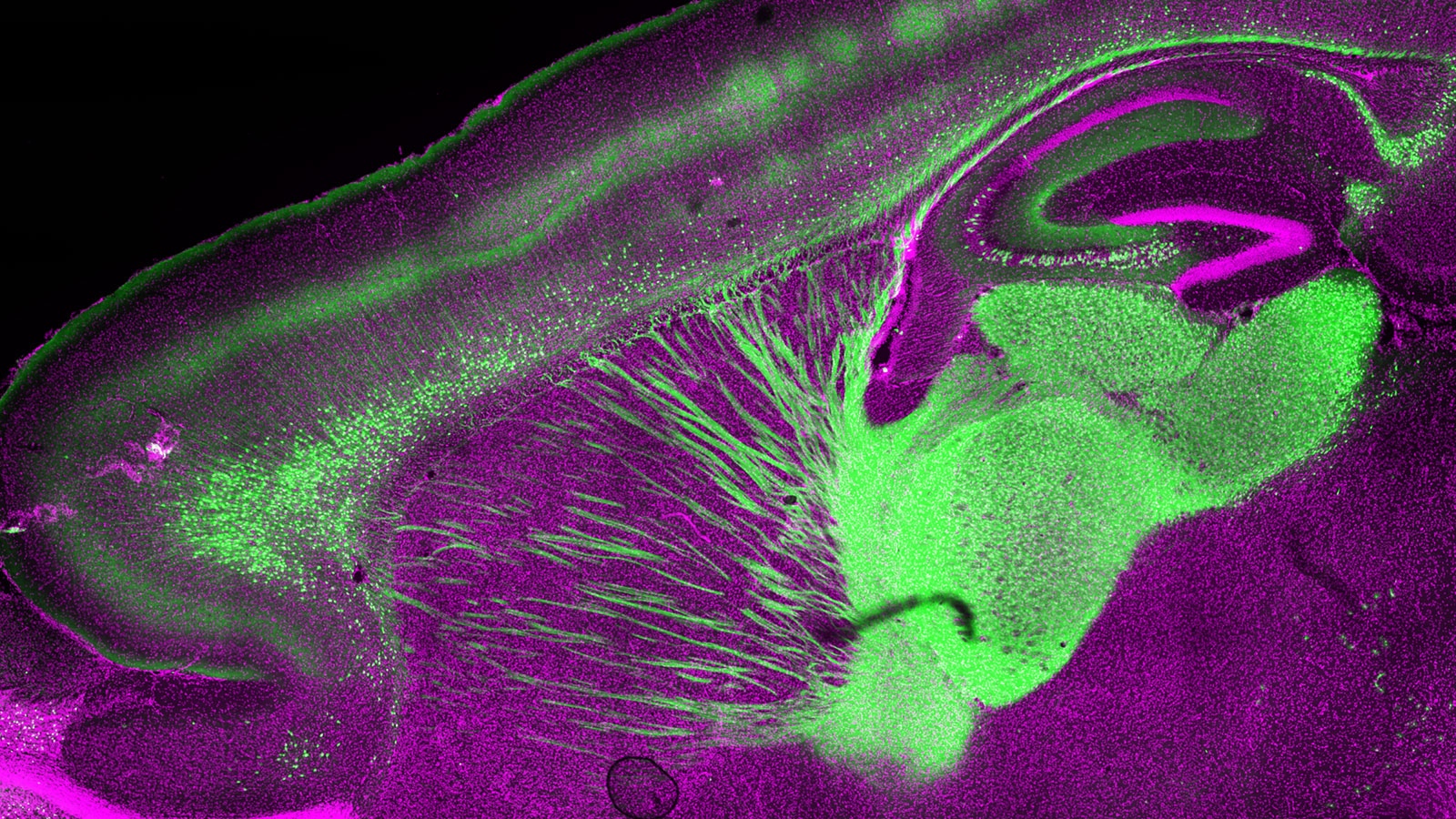
Program Overview

Our program combines rigorous coursework and sound training in the fundamentals of neuroscience, including the integrated study of nervous system function and disease, with opportunities for state-of-the-art research.
Please reach out to Bruce Carter if you have any questions about the Neuroscience Ph.D. Program or the application process.
Bruce Carter
Director of Graduate Studies in Neuroscience
Associate Director for Education and Training, Vanderbilt Brain Institute Professor of Biochemistry
- 615-936-3041
- 625 Light Hall
View profile

We foster the development from trainee to independent research scientist and educator.
Individualized Attention
With 81 graduate students and 64 training faculty, our excellent student-teacher ratio results in extensive opportunities for interaction and exchange of ideas in a relaxed and collegial atmosphere. Our distinguished training faculty stem from diverse fields such as Psychology, Biochemistry, Molecular Physiology, and Pharmacology and capture the multidisciplinary nature of modern neurobiological inquiry.
Career Outlook
Graduates of our department are superbly prepared for a variety of career options in both academia and industry. Each student's program is designed to provide a broad-based education in neuroscience, yet accommodate individual needs and interests to allow students to become creative, independent scientists.
Students holding degrees in the biological or physical sciences, psychology, or biomedical engineering are especially encouraged to apply to the Neuroscience Ph.D. Program, but applicants from other fields will be considered.

Areas of Concentration
The Neuroscience Ph.D program offers two areas of concentration. Students have the option to emphasize either Cellular & Molecular or Cognitive & Systems neuroscience, preparing each trainee for a future in which neuroscientists must be able to navigate from molecules to cells to neural systems and behavior.
Cognitive & Systems
This path provides doctoral training with emphasis on cognitive neuroscience, sensory-motor systems, neuroimaging, neural development, synaptic plasticity, neurobiological basis of neuropsychiatric and neurodegenerative disorders, and targeted gene disruption in transgenic animals to ascertain the function of neural genes and establish disease models.
Cellular & Molecular
This path provides doctoral training with emphasis on neurogenetics and genetic dissection of neural development, molecular aspects of synapse formation and plasticity, structure and regulation of ion channels and transporters, targeting and signal transduction, psychotropic drug action, the molecular basis of neuropsychiatric and neurodegenerative disorders, and targeted gene disruption in transgenic animals to ascertain the function of neural genes and establish disease models.
Cellular & Molecular Application Tip
Students with broad biomedical interests are encouraged to apply through the Interdisciplinary Graduate Program in Biological and Biomedical Sciences instead of directly through the Neuroscience Ph.D. Program. This pathways provides a strong foundation in biomedical science prior to matriculation into neuroscience.
Students begin their first year with a general course in graduate level cellular and molecular biology and then begin specialized courses in Neuroscience in the spring semester of their first year.
Grants and Awards
University Tuition Scholarships are service-free awards that pay all or part of tuition costs. The following graduate awards are normally supplemented by a full University Tuition Scholarship, which usually includes student health insurance coverage:
- University Fellowships
- Graduate Teaching Assistantships
- Graduate Research Assistantships
- Traineeships
- Teacher Training Awards
The current stipend level for 2023-2024 is $36,500. In addition, applicants may be nominated at the time of application for Harold S. Vanderbilt graduate scholarships and other awards, which provide an additional stipend of up to $10,000 per year to students of exceptional accomplishment and high promise.
Training in Fundamental Neuroscience T32 Grant
The Neuroscience Graduate Program receives invaluable support from the "Training in Fundamental Neuroscience" NIH T32. Over 70 mentors across 22 departments within 4 schools and colleges are available to train students, with 65+ Neuroscience trainees earning PhDs in the past 5 years. Over 60 trainees have been supported by the T32 since its inception, with over a third subsequently securing their own fellowship funding. Program graduates have gone on to leadership positions in academia, industry, and additional research-related fields, providing a rich alumni network across multiple career tracks. The program includes works-in-progress seminars by all Neuroscience trainees, invited external seminar speakers including several suggested or hosted by trainees, and an annual retreat.
Graduate students interested in joining the training program should contact Dr. Bruce Carter, Associate Director for Education & Training and Director of Graduate Studies for the VBI.
Faculty interested in becoming T32 preceptors should contact Dr. Rebecca A. Ihrie or Dr. Lisa Monteggia, VBI Director.
Rebecca A. Ihrie
Associate Professor, Cell & Developmental Biology and Neurological Surgery
- 615-936-2951
- B2317 Medical Center North
View Profile
Graduate students in the Neuroscience Graduate program receiving Vanderbilt University financial support or services must devote full-time effort to graduate study. Students cannot accept jobs for pay within or outside the University unless prior approval is given by their advisor, their Director of Graduate Studies, and the Dean for the Office of Biomedical Research Education and Training. Exceptions to this rule include part-time internships and activities that contribute to career development and that do not exceed the time commitment outlined by the National Institutes of Health, service as course associates at Vanderbilt, and occasional and temporary part-time pursuits (e.g. house sitting). Engagement in outside employment without obtaining approval may result in loss of financial aid, including stipend.
Neuroscience, PhD
School of medicine.
The Department of Neuroscience offers an interdisciplinary program designed to train doctoral students for independent research and teaching in neuroscience. It is the goal of the program to ensure that candidates for the Ph.D. and M.D./Ph.D. degrees obtain a background covering molecular, cellular, systems, and cognitive approaches to neuroscience, as well as receive training that brings them to the forefront of research in their particular area of interest. A series of core courses in neuroscience, along with advanced electives, seminar series, laboratory rotations, and original independent dissertation research, form the Neuroscience Graduate Training Program.
Students enter the program from different backgrounds and the laboratories in which they elect to work cover different disciplines; therefore, the program is tailored to fit the needs of individual students. The academic year at the Johns Hopkins University School of Medicine is divided into four quarters plus a summer semester. Courses are designed so that students have ample time to become involved in laboratory rotations. These laboratory rotations expose the student to a variety of current research techniques in neuroscience and provide an opportunity for the student to select a laboratory in which to conduct dissertation research. Scheduling of the three rotations is adjusted to make the most convenient schedule for each student. The rotations are usually completed by the end of the first full year in the program. Most students begin their thesis research at the beginning of their second year.
For more information, please visit The Solomon H. Snyder Department of Neuroscience webpage: http://neuroscience.jhu.edu.
Financial Aid
The program provides tuition remission plus a stipend at or above the National Institutes of Health Predoctoral level for all students. All entering and first-year students are encouraged to apply for individual fellowships such as those sponsored by the National Science Foundation and the Howard Hughes Medical Institute.
Vivien Thomas PhD Scholars at JHU The Vivien Thomas Scholars Initiative (VTSI) is a new endowed fellowship program at Johns Hopkins for PhD students in STEM fields. It provides full tuition, stipend, and benefits while also providing targeted mentoring, networking, community, and professional development opportunities. Students who have attended a historically black college and university ( HBCU ) or other minority serving institution (MSI) for undergraduate study are eligible to apply. More information about the VTSI program is available at this link: https://provost.jhu.edu/about/vivien-thomas-scholars-initiative/ . To be considered for the VTSI, all application and supplementary materials must be received by December 1st .
Admission Requirements
We use a holistic approach to evaluating applicants and look forward to reading your application. We are most enthusiastic about applicants who have taken full advantage of the opportunities available at their undergraduate institution and through other summer or postbac experiences. Our class size is typically ~18 students per year.
Applicants are expected to have received a B.S. or B.A. prior to enrolling in the graduate program. Laboratory research experience prior to enrollment is also desirable. If you have research experience, please describe your research in your Statement of Interest and Career Objectives and indicate the number of months engaged in full-time and part-time research on your CV. Students who do well in our program typically have a strong academic foundation in areas of biological or physical sciences. Some of the courses that prepare students well include general biology, neuroscience, mathematics through calculus, general physics, general chemistry, organic chemistry, statistics, engineering, or computer science.
NOTE: The Neuroscience Program DOES NOT require GRE scores.
Program Requirements
A year-long core course provides an integrated overview of molecular and cellular neuroscience, neuroanatomy and systems, and cognitive neuroscience. This course is aimed at providing Neuroscience graduate students with a foundation for posing meaningful questions in their area of interest. During the first two years, students are required to take 6 graduate level core courses that provide rigorous training in principles of neuroscience research. In addition, students in the first year attend research symposia and complete lab rotations to introduce them to research. Students in the program are also required to participate in core program activities such as seminars, journal clubs, a quantitative analysis boot camp, career development courses and various program events. In addition, each student selects advanced electives offered by members of the Neuroscience Training Program or other departments at the Medical School.
Seminar Program
The Neuroscience Training Program conducts several seminar series to ensure that students are exposed to recent work by researchers from across the country and the world as well as by Hopkins faculty and fellows. Graduate trainees participate actively in these series throughout their training, including inviting and hosting three speakers each year. A weekly lecture is given by an outstanding researcher in some field of neuroscience. Seminars are selected so that an overall balance of subject matter is covered yearly. Students are given an opportunity to meet with each speaker for questions and discussion. Weekly lunchtime talks are presented on current literature by graduate students and postdoctoral fellows. Since an ability to communicate scientific work clearly is essential, graduate students receive close guidance in preparing and evaluating their journal club presentations. Once a month, the faculty, postdoctoral fellows, and students from one laboratory present and discuss the ongoing research in that laboratory. This provides an informal setting to discuss research being conducted in the laboratories of the Neuroscience Training Program and gives advanced graduate students and postdoctoral fellows a forum for presenting their work.
Requirements for the PhD Degree
A minimum residency of two academic years is required. During the course of graduate study, the student must successfully complete the required course requirements. An oral examination, conducted as prescribed by the Doctor of Philosophy Board, must be completed by the end of the second year. The student must then conduct original research and describe this research in a written thesis dissertation, which must be approved by the students Thesis Committee and the Doctor of Philosophy Board.
Training Facilities
The Training Program is centered in the Department of Neuroscience. The Training Program utilizes laboratory facilities located in the Department of Neuroscience plus several other basic and clinical departments closely associated with the Neuroscience Department. All of these laboratories are within a short distance of each other. Modern state of the art facilities for research in molecular biology, neurophysiology, pharmacology, biochemistry, cell biology, and morphology are available. The Mind/Brain Institute, located on the Homewood Campus of the University, is a group of laboratories devoted to the investigation of the neural mechanisms of higher mental function and particularly to the mechanisms of perception. All of the disciplines required to address these questions are represented in the Institute. These include neurophysiology, psychology, theoretical neurobiology, neuroanatomy, and cognitive science. All of the faculty in the Mind/Brain Institute are members of the Neuroscience Graduate Program.
Combined M.D./Ph.D. Program
A subset of the current predoctoral trainees in the Neuroscience Program are candidates for both Ph.D. and M.D. degrees. Applications for admission to the combined program are considered by the M.D./Ph.D. Committee of the School of Medicine. Application forms for the School of Medicine contain a section requesting information relevant to graduate study. Applicants interested in the combined M.D./Ph.D. program should complete this section also, and indicate specifically their interest in the “Neuroscience Training Program”. If application to the combined M.D./Ph.D. program proves unsuccessful and the applicant wishes to be considered for graduate studies, they must notify the Admissions Office of the Neuroscience Training Program by separate letter.
Neuroscience
Share this page.
Neuroscience is an area of study within the Division of Medical Sciences, an administrative unit based at Harvard Medical School that coordinates biomedical PhD activities at the Longwood Medical Area. Students who study in neuroscience receive a PhD in neurobiology. Prospective students apply through the Harvard Kenneth C. Griffin Graduate School of Arts and Sciences (Harvard Griffin GSAS). In the online application, select “Division of Medical Sciences” as your program choice and select "Neuroscience" in the area of study menu.
Neuroscience is one of the programs in the Harvard Integrated Life Sciences, which facilitates collaboration and cross-disciplinary research. Visit HILS for additional application instructions .
This interdisciplinary program includes over 150 faculty members from several hospitals and campuses in the Boston area with a variety of backgrounds in all areas of neuroscience. You will receive a solid core foundation and will then be able to focus on the area that interests you most with specialized training.
You will have access to an impressive array of resources, including state-of-the-art labs, high-resolution microscopy facilities, animal cores, and an instrumentation core that can design custom behavioral chambers and other experimental apparatuses. You will have the opportunity to engage with the broader neuroscience community in several ways, including through the Harvard Brain Science Initiative (HBI), a cross-schools initiative among neuroscientists in the University and its affiliated hospitals.
Students are working on various projects such as studying how neural circuits generate behavior through the use of in vivo imaging to study neurons in awake, behaving animals; the development of the nervous system; the ways in which genes and molecules regulate neural function; and the electrical properties of neurons.
Graduates of the program have secured faculty positions at institutions such as Stanford University, Holy Cross University, Rutgers University, and Harvard University. Others have established careers with leading organizations such as Biogen, Google, and McKinsey & Company.
Standardized Tests
GRE General: Not Accepted GRE Subject: Not Accepted iBT TOEFL minimum score: 100 IELTS minimum score: 7
See list of Neuroscience faculty
APPLICATION DEADLINE
Questions about the program.
PhD Program Admissions

Visualization of copper in normal (top row) and mutant (bottom row) zebrafish brains. Image by Tong Xiao, Chang lab.
The application deadline for Fall 2024 admission was November 27th, 2023 (by 8:59 pm Pacific Standard Time).
The Neuroscience PhD Program grants PhDs only. We do not offer a master’s degree. Applications are accepted from the middle of September through the end of November for admission for Fall of the following year. We do not accept applications for spring semester. All application materials must be received by the deadline. Late applications are not accepted or reviewed.
Applications will be reviewed holistically, using a rubric that considers academic preparation, research experience, contributions to diversity and community, initiative and motivation, and synergy with the program, each evaluated in the context of the individual applicant.
For more information please visit:
- Which Program is Right For You
- Steps to a PhD
- Application Requirements
- Review Process
Areas of Neuroscience
The Neuroscience PhD Program provides research training in four broad areas of neuroscience: cellular & molecular neuroscience, circuit, systems & behavioral neuroscience, human cognition, and computational neuroscience. Read more about each below.
Molecular & Cellular Neuroscience
Molecular and cellular neuroscientists at Berkeley study neuronal cell biology, cellular physiology, and molecular and genetic basis of neuron, synapse, and glial function. Specific topics include sensory transduction, cellular-level neuronal development, synaptic transmission and plasticity, ion channel physiology, neurodegenerative disease, and neurodevelopmental disorders. Many faculty develop novel molecular genetic tools to more precisely measure cellular physiology or to develop new therapeutical approaches to disease. Methods from molecular biology, computational biology (bioinformatics), and cellular physiology are often used in this research.
Circuit, Systems & Behavioral Neuroscience
Circuit, systems and behavioral neuroscientists at UC Berkeley study how neural circuits, ensembles, and large-scale neural systems process information in order to interpret the sensory world, make and recall memories, and produce specific behaviors. Our faculty study neural systems for sensory processing (vision, audition, touch), innate behaviors, memory, navigation, motivated behaviors, sleep, circadian rhythms, social behaviors, decision making, and more. This research often involves neurophysiology, imaging, and optogenetics experiments, usually in behaving animals. Computational models of neural circuits, and sophisticated data analysis involving modeling and machine learning, are often used in this research.
Cognitive Neuroscience
Cognitive neuroscience at UC Berkeley focuses on human cognition and its brain correlates. Our faculty study the human cognitive abilities and neural mechanisms underlying learning and memory, decision making, perception, reasoning, attention, sleep, motor control, etc. Berkeley human cognition labs employ a broad range of experimental techniques, including functional and structural neuroimaging, electrophysiology, brain stimulation, pharmacology, computational modeling, and quantitative behavioral analyses.
Computational Neuroscience
Although quantitative methods are used in all sub areas of neuroscience for analyzing complex data sets, the focus of Computational Neuroscience is to model the brain or brain function: computational models can attempt to model experimental data obtained in neurophysiological experiments (biophysically plausible models) or model functions achieved by the brain such as object recognition, language comprehension, symbolic manipulations, etc. A strong mathematical and programming background is required for research in Computational Neuroscience.
Please see the Neuroscience Department page: Diversity, Equity & Inclusion .
Recorded Info Session:
Friday, November 3, 2023 11am-12pm Pacific Time Neuroscience PhD Program – Diversity Admissions Fair Info Session Hosted by Program Faculty with Current Students Session Recording
Previously Recorded Info Session:
Friday, November 4, 2022 10-11am Pacific Time AMA Grad Student Panel for Prospective Applicants Hosted by Current Students Session Recording
현재 사용중인 브라우저는 지원이 중단된 브라우저입니다. 원활한 온라인 서비스를 위해 브라우저를 최신 버전 으로 업데이트 해주시길 바랍니다.

- Admissions Information
Academics / Programs
snu graduate college list
SNU has one Graduate School with 106 programs across five fields of study. Interdisciplinary programs are operated by more than two different departments. Most of the majors below offer both master's Master's and Doctoral programs ; the those marked with * offer only Master's, and with ** only Doctoral degrees.
Humanities & Social Sciences

Korean Language and Literature
Chinese Language and Literature
English Language and Literature
French Language and Literature
German Language and Literature
Russian Language and Literature
Hispanic Language and Literature
Linguistics
Korean History
Asian History
Western History
- Oriental Philosophy
- Western Philosophy
Archaeology and Art History
- Archaeology
- Art History
Religious Studies
Political Science and International Relations
- Political Science
- International Relations
Anthropology
Social Welfare
Communication
Business Administration
Korean Language Education
Foreign Language Education
- English Language Education
- French Language Education
- German Language Education
Social Studies Education
- Social Studies Education
- History Education
- Geography Education
Ethics Education
Physical Education
Agricultural Economics and Rural Development
- Agricultural Economics
- Regional Information
Consumer Science
Child Development & Family Studies
Public Administration **
Environmental Planning **
Asian Languages and Civilization *
Natural Sciences

Mathematical Sciences
Physics and Astronomy
- Astronomy
Biological Sciences
Earth and Environmental Sciences
Mathematics Education
Science Education
- Physics Education
- Chemistry Education
- Biology Education
- Earth Science Education
Agriculture, Forestry and Bioresources
- Crop Science and Biotechnology
- Horticultural Science
- Forest Environmental Science
- Environmental Materials Science
- Biomaterials Engineering
Agricultural Biotechnology
- Food Science and Biotechnology
- Animal Science and Biotechnology
- Applied Life Chemistry
- Plant Microbiology
- Entomology
- Biomodulation
Biosystems Engineering
Landscape Architecture and Rural System Engineering
- Landscape Architecture
- Rural System Engineering
Agricultural and Vocational Education
Food and Nutrition
Textiles, Merchandising & Fashion Design
Pharmaceutical Sciences
Brain & Cognitive Sciences
Biophysics and Chemical Biology
Biomodulation
Public Health **
Engineering

Civil & Environmental Engineering
Mechanical Engineering
Industrial Engineering
Aerospace Engineering
Materials Sciences and Engineering
Energy Systems Engineering
Computer Science and Engineering
Electrical and Computer Engineering
Architecture
Chemical and Biological Engineering
Hybrid Materials
Multiscale Mechanical Design
Naval Architecture and Ocean Engineering
Chemical Convergence for Energy and Environment

Biomedical Sciences
Dental Science
Veterinary Medicine

- Oriental Painting *
- Painting *
- Sculpture *
- Fine Arts **
Crafts & Design
- Vocal Music
- Composition
- Musicology
- Woodwind and Brass
- Korean Music
Interdisciplinary Programs

Classical Studies
Cognitive Science
Comparative Literature
Archival Studies
Performing Arts Studies
Gender Studies
History and Philosophy of Science
Genetic Engineering
Neuroscience
Bioinformatics
Computational Science and Technology
Technology Management, Economics and Policy
Urban Design
Bioengineering
Offshore Plant Engineering
Agricultural and Forest Meteorology
Agricultural Genomics
Art Management
Music Education
Art Education
Home Economics Education
Special Education
Environment Education
Early Childhood Education
Global Education Cooperation
Zoonotic Animal Diseases
Cancer Biology
Clinical Pharmacology
Medical Informatics
Stem Cell Biology
Landscape Architecture **
Artificial Intelligence
30 Best universities for Psychology in Moscow, Russia
Updated: February 29, 2024
- Art & Design
- Computer Science
- Engineering
- Environmental Science
- Liberal Arts & Social Sciences
- Mathematics
Below is a list of best universities in Moscow ranked based on their research performance in Psychology. A graph of 406K citations received by 66.7K academic papers made by 30 universities in Moscow was used to calculate publications' ratings, which then were adjusted for release dates and added to final scores.
We don't distinguish between undergraduate and graduate programs nor do we adjust for current majors offered. You can find information about granted degrees on a university page but always double-check with the university website.
1. Moscow State University
For Psychology

2. National Research University Higher School of Economics

3. Moscow Medical Academy

4. Russian National Research Medical University

5. RUDN University

6. Moscow Institute of Physics and Technology

7. National Research Nuclear University MEPI

8. Russian Presidential Academy of National Economy and Public Administration

9. Moscow State Pedagogical University

10. Finance Academy under the Government of the Russian Federation

11. Bauman Moscow State Technical University

12. Moscow State Institute of International Relations

13. N.R.U. Moscow Power Engineering Institute

14. Moscow Aviation Institute

15. Plekhanov Russian University of Economics

16. Russian State University for the Humanities

17. State University of Management

18. Russian State Social University

19. National University of Science and Technology "MISIS"

20. Moscow State Linguistic University

21. New Economic School

22. Russian State University of Oil and Gas
23. mendeleev university of chemical technology of russia.

24. Moscow Polytech

25. Moscow State University of Railway Engineering

26. National Research University of Electronic Technology

27. Moscow State Technological University "Stankin"

28. Pushkin State Russian Language Institute
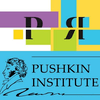
29. Russian State Agricultural University

30. Moscow International University

Universities for Psychology near Moscow
Psychology subfields in moscow.
1 MSc Degrees in Neuroscience in Moscow, Russia for 2024
- Health Care
- Neuroscience Studies
- Neuroscience
Health Care (1)
- Biomedical Studies (1)
- Mental Healthcare (3)
- Neuroscience (1)
- Back to main category
- United Kingdom (0)
- Australia (0)
- Bachelor (0)
- Certificate (0)
- Diploma (0)
- Associate of Applied Science (0)
- Associate Degree (0)
- Graduate Certificate (0)
- Associate of Arts (0)
- Summer Course (0)
- Advanced Diploma (0)
- Graduate Diploma (0)
- Postgraduate Diploma (0)
- Foundation Year (0)
- Postgraduate Certificate (0)
- A-level (0)
- Preparatory Program (0)
- Doctor of Education (0)
- Juris Doctor (0)
- Advanced Certificate (0)
- Undergraduate Pathway (0)
- Undergraduate Certificate (0)
- Graduate Pathway (0)
- 3 years (0)
- 2 years (1)
- Full time (1)
- Part time (0)
- English (1)
- Spanish (0)
- Portuguese (0)
- Italian (0)
- On-Campus (1)
- Distance Learning (0)
- Blended (0)
MSc in Cognitive Sciences and Technologies: From Neuron to Cognition
Hse university.

- Moscow, Russia
- Saint Petersburg, Russia
Our Master's program offers courses in cognitive psychology, cognitive neuroscience, and neuro-modeling. Taken together these disciplines study how memories, emotions, cognition, or consciousness actually work. Students attend lectures in English and practice in leading laboratories of Moscow and of our international partners.
Popular study format
Popular education type
Best Global Universities in Russia
These universities in Russia have been numerically ranked based on their positions in the overall Best Global Universities rankings. Schools were evaluated based on their research performance and their ratings by members of the academic community around the world and within Europe. These are the top global universities in Russia. Read the methodology »
To unlock more data and access tools to help you get into your dream school, sign up for the U.S. News College Compass !
Here are the best global universities in Russia
Lomonosov moscow state university, moscow institute of physics & technology, national research nuclear university mephi (moscow engineering physics institute), hse university (national research university higher school of economics), novosibirsk state university, tomsk state university, sechenov first moscow state medical university, saint petersburg state university, peter the great st. petersburg polytechnic university, itmo university.
See the full rankings
- Clear Filters
- # 1 in Best Universities in Russia
- # 355 in Best Global Universities
- # 2 in Best Universities in Russia
- # 475 in Best Global Universities (tie)
- # 3 in Best Universities in Russia
- # 483 in Best Global Universities (tie)
- # 4 in Best Universities in Russia
- # 561 in Best Global Universities (tie)
- # 5 in Best Universities in Russia
- # 579 in Best Global Universities (tie)
- # 6 in Best Universities in Russia
- # 587 in Best Global Universities (tie)
- # 7 in Best Universities in Russia
- # 633 in Best Global Universities (tie)
- # 8 in Best Universities in Russia
- # 652 in Best Global Universities
- # 9 in Best Universities in Russia
- # 679 in Best Global Universities (tie)
- # 10 in Best Universities in Russia
- # 696 in Best Global Universities (tie)

IMAGES
VIDEO
COMMENTS
Ranked in 2022, part of Best Science Schools. Nervous system functions are a central focus in neuroscience and neurobiology courses. After graduation, scientists may work in fields such as brain ...
About This List. Explore neuroscience and neurobiology graduate programs and graduate schools offering neuroscience and neurobiology degrees. Compare graduate neuroscience and neurobiology programs with government statistics and graduate student reviews. Find the best neuroscience and neurobiology graduate schools for you.
The Stanford Neurosciences Interdepartmental Program (IDP) offers interdisciplinary training leading to a Ph.D. in Neuroscience. The primary goal of the program is to train students to become leaders in neuroscience research, education and outreach. Graduates of the program will be innovators, investigators, and teachers whose programs and ...
One of the best neuroscience PhD programs the USA provides, it enables students to design their post-graduate studies by working collaboratively with an extensive network of faculty and labs. Courses: Responsible conduct of neuroscience, neuroscience systems core, and neurogenetics core. Credits: 135 units. Duration: 5 years.
Bruce Carter. Director of Graduate Studies in Neuroscience. Associate Director for Education and Training, Vanderbilt Brain Institute. Professor of Biochemistry. Email. 615-936-3041. 625 Light Hall. View profile. We foster the development from trainee to independent research scientist and educator.
These include neurophysiology, psychology, theoretical neurobiology, neuroanatomy, and cognitive science. All of the faculty in the Mind/Brain Institute are members of the Neuroscience Graduate Program. Combined M.D./Ph.D. Program. A subset of the current predoctoral trainees in the Neuroscience Program are candidates for both Ph.D. and M.D ...
The Program in Neuroscience (PiN) is a full-time lab-based PhD program comprising a core curriculum that encompasses the interrelated disciplines of neuroscience, elective requirements in computational neuroscience and neuroanatomy, and training across multiple research areas and techniques through first-year lab rotations and dissertation research supported by a robust advising structure.
The Neuroscience PhD Program trains a select group of students (about 10-12 entering students per year) in an intellectually stimulating and supportive environment. Since its official launch in 2000, the program has trained more than 150 students. Our applicants have outstanding undergraduate records in both research and scholarship from ...
The Columbia Access Neuroscience (CAN) Application deadline has been extended to March 8th, 2024. You can find out more about CAN here, and access the CAN application. Columbia Access Neuroscience (CAN) is an informative two-day event for students from underrepresented backgrounds who are interested in pursuing a Ph.D. in neuroscience.
Kent State University. Neuroscience. University of California, Riverside. Psychological and Brain Sciences. Johns Hopkins University. Neuroscience. Florida State University. This page shows a selection of the available PhDs in United States. If you're interested in studying a Neuroscience degree in United States you can view all 100 PhDs.
My role is to empower. March 22, 2023. PiN alum Soyon Hong is a group leader at the UK Dementia Research Institute at UCL. Her lab is interested in investigating how multiple cell types work together to maintain brain function, and how these interactions are affected and altered in neurodegenerative disease states such as Alzheimer's disease ...
Neuroscience is one of the programs in the Harvard Integrated Life Sciences, which facilitates collaboration and cross-disciplinary research. Neuroscience is an area of study within the Division of Medical Sciences, an administrative unit based at Harvard Medical School that coordinates biomedical PhD activities at the Longwood Medical Area.
Welcome to the GPN! The Graduate Program in Neuroscience (GPN) at the University of Minnesota is a large interdisciplinary PhD program, made up of over 125 faculty members. Our goal is to provide training in neuroscience research across a broad range of techniques and disciplines, ranging from the molecular and genetic level to computational.
Find the best PhD programmes in the field of Neuroscience from top universities in United States. Check all 100 programmes. Explore; Decide; Apply; Explore. ... The Graduate Program in Neuroscience at the University of Washington is an interdisciplinary Ph.D. program with approximately 70 current students, and more than 170 faculty members with ...
The application deadline for Fall 2024 admission was November 27th, 2023 (by 8:59 pm Pacific Standard Time). The Neuroscience PhD Program grants PhDs only. We do not offer a master's degree. Applications are accepted from the middle of September through the end of November for admission for Fall of the following year.
Nutrition and Food Science 3690. Oncology and Cancer research 3216. Paleontology 5892. Pharmacology 3471. Toxicology 1466. Virology 3138. Wildlife and Fisheries Management & Conservation 3195. Zoology 3255. Below is the list of 100 best universities for Neuroscience in the World ranked based on their research performance: a graph of 246M ...
Discover the highest ranked universities in Germany according to the QS World University Rankings®. Discover the top universities for studying psychology in the QS World University Rankings by Subject 2023 here. Discover the top 10 universities in London this year, based on the QS World University Rankings 2024.
Graduate. SNU has one Graduate School with 106 programs across five fields of study. Interdisciplinary programs are operated by more than two different departments. Most of the majors below offer both master's Master's and Doctoral programs ; the those marked with * offer only Master's, and with ** only Doctoral degrees. Homepage.
The programs on this list vary greatly in terms of cost. On the high end, the Chicago School at Los Angeles charges $1,703 per credit. At $528 per credit, Keiser University-Ft. Lauderdale offers ...
Moscow 30. Saint Petersburg 17. Omsk 6. Tomsk 6. Below is the list of 30 best universities for Psychology in Moscow, Russia ranked based on their research performance: a graph of 406K citations received by 66.7K academic papers made by these universities was used to calculate ratings and create the top.
Neuroscience Program and Community Calendar ... Contact; You are here. Home > Neuroscience Faculty Candidate Seminar | Kristen Berendzen, MD, PhD. Neuroscience Faculty Candidate Seminar | Kristen Berendzen, MD, PhD. Date: April 4, 2024. Time: 11:00 am - 12:00 pm . Please email Lucita Nacionales for the Zoom Link. Sidebar Top. Seminar Series ...
Our Master's program offers courses in cognitive psychology, cognitive neuroscience, and neuro-modeling. Taken together these disciplines study how memories, emotions, cognition, or consciousness actually work. Students attend lectures in English and practice in leading laboratories of Moscow and of our international partners.
Germany. India. Italy. Japan. Netherlands. See the US News ranking for the top universities in Russia. Find the rankings for Russia's best universities at US News.